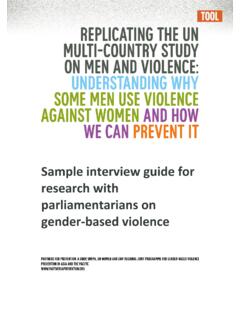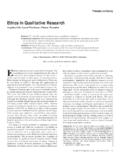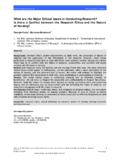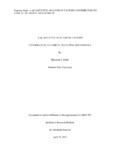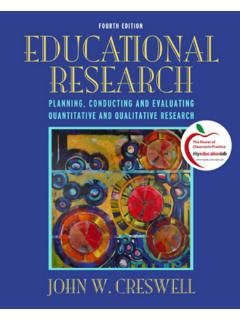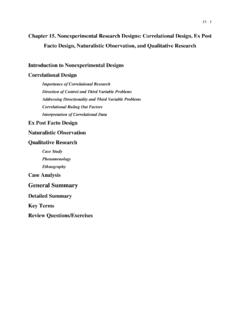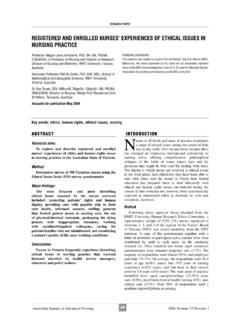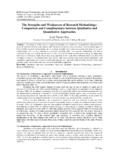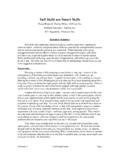Transcription of Ethical and safety guidelines for research on gender ...
1 Ethical and safety guidelines for research on gender - based violence 1. Acknowledgements This Ethical and safety guidelines for research on gender -Based Violence was produced for Partners for Prevention by Emma Fulu and James Lang, both with Partners for Prevention in Thailand, with input from Claudia Garcia-Moreno of the World Health Organization in Switzerland and Rachel Jewkes of the Medical research Council in South Africa. All parties replicating the United Nations Multi-Country Study on Men and Violence methodology must adhere to these Ethical and safety guidelines , which are based on: World Health Organization (2003). Putting Women First: Ethical and safety Recommendations for research on Domestic Violence Against Women. ( tml).
2 Jewkes, R., E. Dartnall and Y. Sikweyiya (2012). Ethical and safety Recommendations for research on the Perpetration of Sexual Violence. Sexual Violence research Initiative. Pretoria, South Africa, Medical research Council. Available from 2. Ethical and safety guidelines Ethical Considerations research on violence against women raises important Ethical and methodological challenges in addition to those posed by any research It is not an exaggeration to say that the physical safety and psychological well-being of both the respondents and the research team can be put in jeopardy if adequate precautions are not taken. 1. There are number of Ethical considerations that need to be made when conducting research on violence against women.
3 The International research Network on Violence and Women and the World Health Organization stipulates the prime importance of: confidentiality and safety ; the need to ensure that the research does not cause any participant to experience further harm (including not causing the participant further trauma); the importance of ensuring that the participant is informed of available sources of help; and the need for the interviewers to respect an interviewee's decisions and choices. Ethics clearance All parties using the United Nations Multi-Country Study on Men and Violence methodology should apply for Ethical clearance from a national ethics board before commencing the research . Individual consent At the start of all interviews, participants are informed of the purpose and nature of the study through the information and consent form.
4 In most cases the respondent will be asked to sign a consent form; due to the low levels of literacy in some settings where the study will be conducted and the fear some people may have in recording their name, another option is for the interviewer to get verbal consent and record that the consent procedure has been administered. As part of the consent procedure, the participants are informed that the data collected will be held in strict confidence. To ensure that the participant is aware that the survey includes questions on highly personal and sensitive topics, the interviewer will forewarn the participant that some of the topics are difficult to talk about. The respondent will be free to terminate the interview at any point and to skip any question that he/she does not want to answer.
5 The participants will also receive an information leaflet with the contact details of the research team and sources of support for a range of problems. They will also be provided with an information sheet that is appropriately detailed and explicit about the 1. World Health Organization (2003). Putting Women First: Ethical and safety Recommendations for research on Domestic Violence Against Women. Geneva, pp. 6-7. 3. fact the survey contains questions relating to violence and sexual behaviour; however, this sheet need not be left with participants if they do not want it, for safety reasons. Voluntary participation Participation in the study is on a voluntary basis. No inducements will be made. Where appropriate, incurred expenses (such as for transport) could be reimbursed.
6 Participants must be clear that refusal to participate will not result in any negative consequences. Confidentiality Much of the information provided by the participants will be extremely personal. Confidentiality of the information collected during the survey is of fundamental importance. The male questionnaire asks participants about the perpetration of criminal behaviour, including rape, and thus it is vital that even the interviewer is not aware of their responses to avoid Ethical dilemmas about the need to report to the police. A number of mechanisms will be used to protect the confidentiality of the information collected: All interviewers will receive strict instructions about the importance of maintaining confidentiality.
7 No interviewer will conduct an interview in their own community. No names will be recorded. Instead, households will be identified using a unique code. The identifiers linking the questionnaire with the household location will be kept separate from the questionnaires. Upon completion of the survey, the identifiers and the household lists will be destroyed. In all further analysis, the codes will be used to distinguish questionnaires. Tapes made of in-depth interviews (qualitative research ) will be kept in a locked file. Again, no record of the name of the interviewee will be kept. Particular care will be taken during the presentation of the research findings to ensure that the information presented is sufficiently aggregated so that no one community or individual can be identified.
8 Where case study findings are presented, sufficient detail will be changed to ensure that the source of the information cannot be identified. The questions related to the perpetration of sexual abuse and other particularly sensitive questions will be self-administered, using PDAs. Physical safety of informants and researchers The physical safety of interviewees and interviewers is paramount. If the focus of the survey becomes widely known either within the household or among the wider community the topic of the interview may become known to a perpetrator of violence. For people experiencing violence, the mere act of participating in a study may provoke further abuse. This may place the respondent or the interview team at risk of violence, either before, during or after the interview.
9 For this reason, the following measures will be adopted to ensure that the research topic does not become widely known: 4. To enable the respondent to explain the study to others safely, the survey will be framed with a safe name that does not include the word violence' and will be introduced at the community and household levels in this manner. An example of a safe name could be The Study on Men's Health and Life Experiences.'. Interviews will only be conducted in a private setting. Only very young children (younger than 2 years) will be permitted to be present. Where necessary, locations outside the household where the interview can be conducted in private will be identified (such as in nearby fields or at a local clinic, church or temple).
10 The participant will be free to reschedule (or relocate) the interview to a time (or place) that may be more convenient for him/her. Interviewers will be trained to terminate or change the subject of discussion if an interview is interrupted by anyone. Do no harm Violence against women and many of the other issues covered in the survey, such as sexuality, drug use and transactional sex, are sensitive and stigmatized issues; men may fear answering such questions. For this reason, particular care will be taken to ensure that all questions are asked sensitively, in a supportive and non-judgemental manner. Interviewers will be trained to be aware of the effects that the questions may have on the informant and, if necessary, will terminate the interview if the effect seems too negative.
